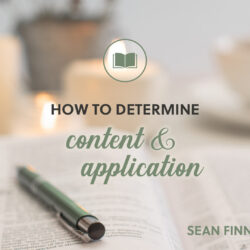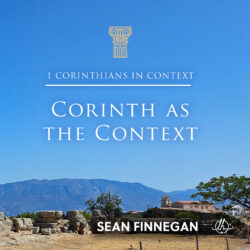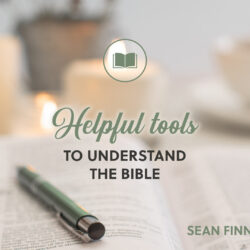This is part 3 of the Read the Bible For Yourself.
Today is the first of two episodes on how to understand and apply the Bible. One of the greatest problems facing Bible readers today is the lifted verse. It’s so common to see a verse or even half a verse posted on social media or on a sign somewhere. When most people read a random verse, they impose their own modern context and background information on it. As a result, it’s easy to accidentally give a scripture new meaning that the original author never intended. How can we overcome this problem? Context. Today you’ll learn about the 5 major contexts that are important to keep in mind when reading the Bible.
Listen to this episode on Spotify or Apple Podcasts
—— Links ——
- See other episodes in Read the Bible For Yourself
- Other classes are available here, including How We Got the Bible, which explores the manuscript transmission and translation of the Bible
- Get the transcript of this episode
- Support Restitutio by donating here
- Join our Restitutio Facebook Group and follow Sean Finnegan on Twitter @RestitutioSF
- Leave a voice message via SpeakPipe with questions or comments and we may play them out on the air
- Intro music: Good Vibes by MBB Attribution-ShareAlike 3.0 Unported (CC BY-SA 3.0) Free Download / Stream: Music promoted by Audio Library.
- Who is Sean Finnegan? Read his bio here
—— Notes ——
Exegesis: a careful explanation of a text
- synonyms: explanation, exposition, elucidation
- to exegete a text is to understand it correctly so that you can explain it
Hunger for Scripture
- Ask God to give you a desire to read the Bible
Two Questions
- What did it mean to the original audience then?
- What does it mean to you today?
Context, Context, Context
- Immediate context
- Canonical context
- Historical context
- Geographical context
- Cultural context
Immediate Context
- Philippians 4:13 I can do all things through him who strengthens me.
- Putting this verse in context:
Philippians 4:10-14
10 I rejoiced in the Lord greatly that now at length you have revived your concern for me. You were indeed concerned for me, but you had no opportunity. 11 Not that I am speaking of being in need, for I have learned in whatever situation I am to be content. 12 I know how to be brought low, and I know how to abound. In any and every circumstance, I have learned the secret of facing plenty and hunger, abundance and need. 13 I can do all things through him who strengthens me. 14 Yet it was kind of you to share my trouble.
Canonical Context
- Leviticus 11:4, 7
4 But among those that chew the cud or have divided hoofs, you shall not eat the following: the camel, for even though it chews the cud, it does not have divided hoofs; it is unclean for you. …7 The pig, for even though it has divided hoofs and is cleft-footed, it does not chew the cud; it is unclean for you. - To whom were these statements originally made?
- Leviticus 11:1-2
1 The LORD spoke to Moses and Aaron, saying to them, 2 “Speak to the Israelites: “From among all the land animals, these are the creatures that you may eat.
Historical Context
- Jeremiah 29:11
For surely I know the plans I have for you, says the LORD, plans for your welfare and not for harm, to give you a future with hope. - What were the historical circumstances in which this statement was originally made?
- Jeremiah 29:1
These are the words of the letter that the prophet Jeremiah sent from Jerusalem to the remaining elders among the exiles and to the priests, the prophets, and all the people whom Nebuchadnezzar had taken into exile from Jerusalem to Babylon.
Geographical Context
- John 2:13
The Passover of the Jews was near, and Jesus went up to Jerusalem. - Does this mean Jesus was south of Jerusalem?
- Actually, here “up” refers to elevation, since Jerusalem is on a hill. People go up to Jerusalem regardless of the direction from which they approach.
Cultural Context
- Abraham and Sarah (nomadic)
- Solomon (palace life in the United Kingdom of Israel)
- Daniel (palace life in Babylon)
- Jesus (Galilee and Judea under Roman occupation)
- Paul (major Greco-Roman cities)
Chronological Snobbery
- Originally coined by C. S. Lewis, this refers to the judgmental attitude that looks at people in ancient history as unsophisticated, primitive, and inferior.
- Ancient people were not dumb. They were no smarter or dumber than we are.
- Some of their technology was rather sophisticated.
Literal vs. Figurative
- Didymus the Blind (ad 313-398): “Abraham entered then into Egypt allegorically by adapting himself as one of the perfect to the imperfect in order to do good to them instead of holding on to virtue as a privilege, as has been said above, but in showing her to all as his sister, in humility, so that by contemplating her they might come to love her. But observe how it is said that the officials saw her. There are in fact in the ranks of the allegorically viewed Egyptians some men who are purer, who have a great capacity for perceiving virtue. And they not only perceived her, but they introduced her to their superior, that is, to the reason that governs them, and they praised her” (On Genesis 228).[1]
- Sadly, Didymus overlayed the historical narrative of scripture with lessons about treasuring wisdom that were obviously not present in the text.
- Figurative sections of scripture like Isaiah 55:12 and Revelation 12:4 are fairly obvious.
- Generally, it’s good to interpret the historical, legal, and epistolary portions as literal unless there’s a good reason not to.
Review:
- “Exegesis” is the process by which one studies, understands, and explains what a text means.
- The two questions you must ask when studying the Bible are: (1) “What did this mean to the original audience?” and (2) “What does this mean to me today?”
- Most errors in exegesis are the result of failing to read the immediate context.
- Getting a grip on the context of the original writing greatly improves exegesis, including immediate context, canonical context, historical context, geographical context, cultural context, and technological context.
- While reading historical narratives, law, biographies, and epistles, you should privilege literal interpretation over figurative, recognizing that exceptions can happen.
- If you don’t understand something, just keep going. Figuring out the big picture can help immensely to understand the minutiae.
[1]Sheridan, Mark and Thomas C. Oden, eds., Genesis 12–50 Ancient Christian Commentary on Scripture 2. ICCS/Accordance electronic edition, version 2.8. InterVarsity Press: 2002, Downers Grove.







How can I download “All 150 Psalms Categorized” on my iPad?